Among the many forgotten chores undertaken by our ancestors was the cleaning of mattresses. Every spring or every other spring, mattresses, which were typically filled with natural fibers like moss or hair, would be pulled from beds; the ticking ripped open, boiled, and dried; and the filling material either replaced or more often boiled, sanitized, fluffed, and restuffed. Mattress making and mattress repairing was a viable profession, and one plied by the men and companies featured here into the 1950s.
James J. Reed & Broadway Mattress Works
James Joseph Reed, Sr. was born in Richland Parish in rural northeastern Louisiana on 13 September 1876. His parents were Peter and Harriet (Waples) Reed. As a teenager, he ventured to New Orleans, where he entered the employ of the Southern Spring and Mattress Works. He eventually became foreman in that company’s plant, which was destroyed by fire twice in two years in 1907 and 1909. The company was put into receivership in December 1908 and was completely liquidated by 1910.
In 1909, Reed established his own company, which he dubbed the Broadway Mattress Works. The company’s slogan was “Making Sleep a Pleasure.” In 1916, he opened a plant at 2510 Bell Street, which was about five blocks from his home at 1618 North Broad Street. This plant was destroyed by fire in 1923, which forced him to briefly shift operations to his home and later to 2644 St. Ann Street.
In the fall of 1924, Reed opened a new plant at 1936-1938 St. Louis Street at the corner of North Prieur. After a decade of business, the Broadway Mattress Works could boast of possessing an electric sterilizing machine, electric dryer, two trucks, and a service car, as well as employing six mattress makers and two general helpers. The business continued to prove successful for Mr. Reed, who was known as a sharp dresser and who drove a Pierce Arrow sedan. In 1926, he opened a second showroom at 1315 Tulane Avenue, corner of South Saratoga Street (now a part of the Tulane Medical Center campus).
Reed’s industriousness was due in no small part to the large family he had with his wife, Josephine Davis (daughter of Joseph Davis and Cecile Grant), whom he married on 16 December 1899 (following a brief first marriage). James and Josephine had nine children: James, Jr.; Richard; Harold (vaudeville singer and dancer); Herman (also a vaudevillian); Allan; Roscoe; Robert; Ethel (Reed) Andry; and Gertrude Reed.
In addition to being a local distributor for national brands like Sealy and Blue Ribbon, the Broadway Mattress Works also made beds for private citizens, hospitals and other institutions, and custom jobs, such as for boats. Mattress cleanings generally ran about $1.50, while new mattresses were sold from $10.00 and up. By the 1930s, innerspring mattresses had become popular enough to be within the reach of most consumers although many people still sought “ticking” mattresses. Ticking mattresses were made from layers of felt as well as natural fibers such as cured Spanish moss, hair (white horsehair, black horsehair, and cheaper hog hair), cotton, vegetable hair, husks, coconut husks called coir, and wood shavings called excelsior. Mattresses such as these could be repaired and “renewed” by being sterilized with an alkaline solution, then dried, and restuffed.
Reed’s Broadway Mattress Works was able to survive the Great Depression and shifted the bulk of its work from innerspring mattresses back to repairing ticking mattresses during World War II, when metal spring production was halted and priority in the making of new mattresses was given to orders by the military.
James Joseph Reed, Sr. died on 20 February 1934 at the age of fifty-seven. He was buried from the Grace Methodist Church and interred in his family plot in Mount Olivet Cemetery. Following his death, the Broadway Mattress Works was continued by his eldest son, James J. Reed, Jr., along with his brothers, Roscoe and Richard Reed, assisted by employees Alden Baham and Alfred Haley. A lightning strike caused a fire which destroyed the business in July 1950. Over time, Reed’s widow and all of his surviving children migrated to California.
Joseph O’Brien & O’Brien Mattress Works
It is often said that variety is the spice of life. If that is true, Mr. Joseph O’Brien led a well-seasoned existence. He started his career as a cook, moved on as proprietor of several restaurants, engaged in the prize fighting industry, purchased a laundry, operated a successful furniture store, and finally opened a mattress renovation factory on the first floor of his home in the 1940s.
Born 27 September 1889 to Aristide and Eva O’Brien in Waterloo, Pointe Coupée Parish, Joseph O’Brien and his sister, Marie, moved to New Orleans as children. At the young age of sixteen, he became a cook. He later claimed in an interview with The Louisiana Weekly, that for thirty-five years he traveled the world more than twenty-fives times on every type of craft from a transport boat to a private yacht. He was the second chef at the original Fabacher’s Restaurant, sauce cook at the Grunewald (now Roosevelt) Hotel, and chef at the Comus Restaurant.
Mr. O’Brien decided to go into business for himself in 1919, when he opened his first restaurant with a partner at 211 South Rampart Street. This business was short-lived because his lease could not be renewed upon its expiration. Five years later, in 1924, he opened the Liberty Laundry, said to be the first steam laundry in the South. This venture only lasted three years, largely due to the lack of demand among Negroes for retail laundry service. Mr. O’Brien found time to engage in prizefighting and claimed to have been one of the first Negro referees in the South.
In 1940, he opened a furniture store that sold both new and used items. By 1946, in the face of wartime needs, he converted the furniture store into a mattress renovating factory. He realized the need for such a business in his community. He hired competent help, purchased the necessary equipment, and learned the trade from his employees.
For many years, Joseph O’Brien and his family lived at 824 North Claiborne Avenue, occupying the second floor while the first floor was O’Brien Mattress Works. In addition to his business endeavors, he was active in many civic organizations.
He was a 33rd-degree Prince Hall Mason (Past Master of Berry Lodge No. 2; Past Grand Trustee of the MWPHGLLA; member, Eureka Consistory, AASR, Pelican Commandery, KT, Platta Temple No. 15, AAEONMS) and was instrumental in the construction of the Prince Hall Masonic Temple at 1614 Orleans Avenue at the corner of North Robertson. He was cited in 1963, during the 100th anniversary of the Prince Hall Grand Lodge of Louisiana, for service to his community.
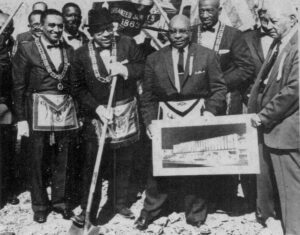
Groundbreaking for the Prince Hall Masonic Temple on Orleans Avenue, May 1962, with Temple Building Committee member Joseph O’Brien pictured at far right.
He was also a member of the National Negro Business League, NAACP, Dryades Street Young Men’s Christian Association, Milne Boys’ Home, and founding member of the Negro Board of Trade.
Joseph O’Brien was married to Mary LaBeau. Together they had one son, Joseph Leo O’Brien. He had one sister, Marie Bell of Oakland, California and seven grandchildren: Joseph, Peter, Mary, and Dennis O’Brien; Patricia Aubry; Linda Blasio; and Gail Barré.
Upon his retirement, Mr. O’Brien passed the business on to his son who continued it for a short period of time. Joseph O’Brien passed away on 17 May 1968. He was buried from St. Luke’s Episcopal Church and interred in St. Louis # 3 Catholic Cemetery.
Lolita Villavasso Cherrie & Jari C. Honora
Sources: “Know Your Business Community,” The Louisiana Weekly, 22 January 1949, p. 4; The New Orleans States-Item, 20 May 1968, p. 2; telephone conversations with granddaughters, Patricia Aubry and Gail Barré, October 2023 (thanks to great-grandson Lance Aubry). –
“Mattresses to User,” The New Orleans States, 26 May 1925, p. 20; “Your Mattress Can be Remade,” The New Orleans Item, 13 November 1929, p. 20; “Local Mattress Plant is Ranked Among the Best,” The New Orleans Item, 30 December 1925, p. 10; “Mattress Works Opens Tulane Avenue Showroom,” The New Orleans States, 4 May 1926, p. 14; “Makes Sleep a Pleasure,” The Times-Picayune, 19 August 1929, p. 18; “James J. Reed Dies After a Brief Illness,” The Louisiana Weekly, 24 February 1934, p. 1; The Crescent City Pictorial (New Orleans: O.C.W. Taylor, 1926), 21, online images, Tulane University Digital Library; Roland J. Davidson, Sitting of the Galerie and Playing on the Banquette: New Orleans Memories (Xlibris, 2016), 90.
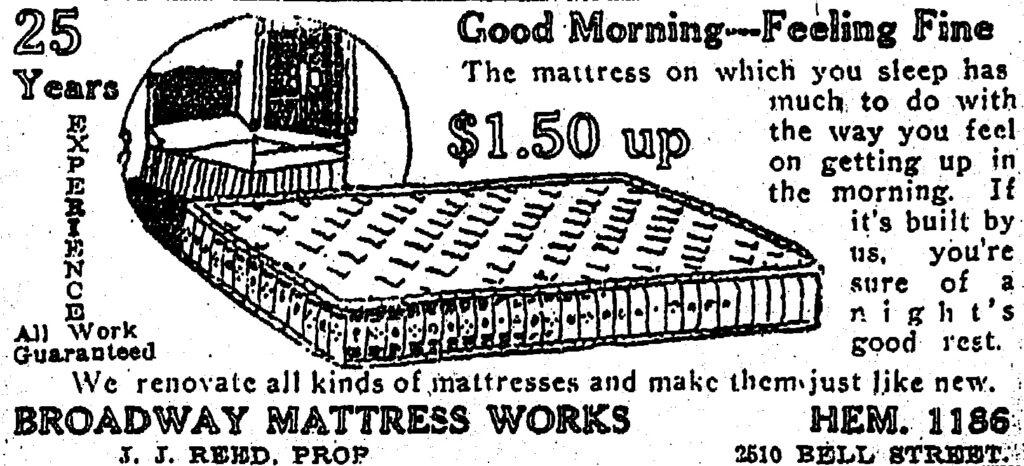
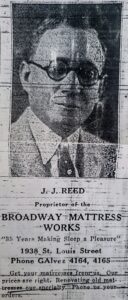
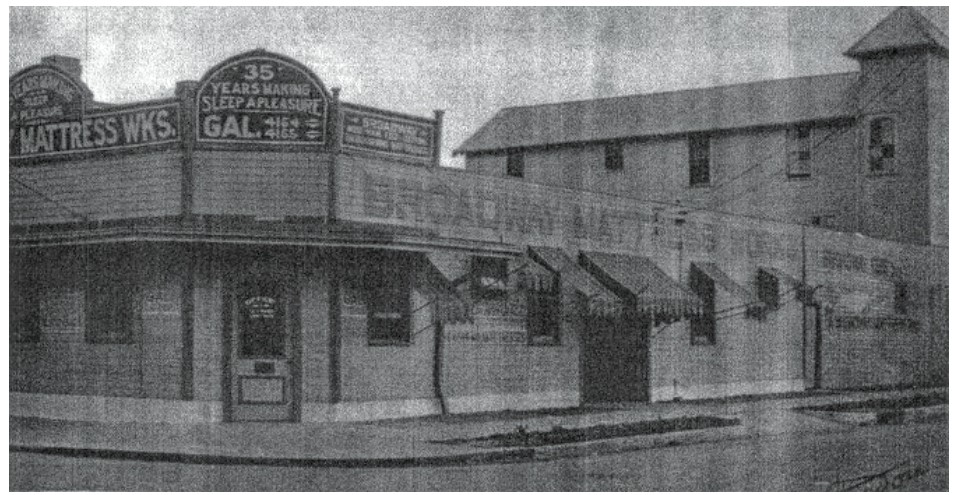
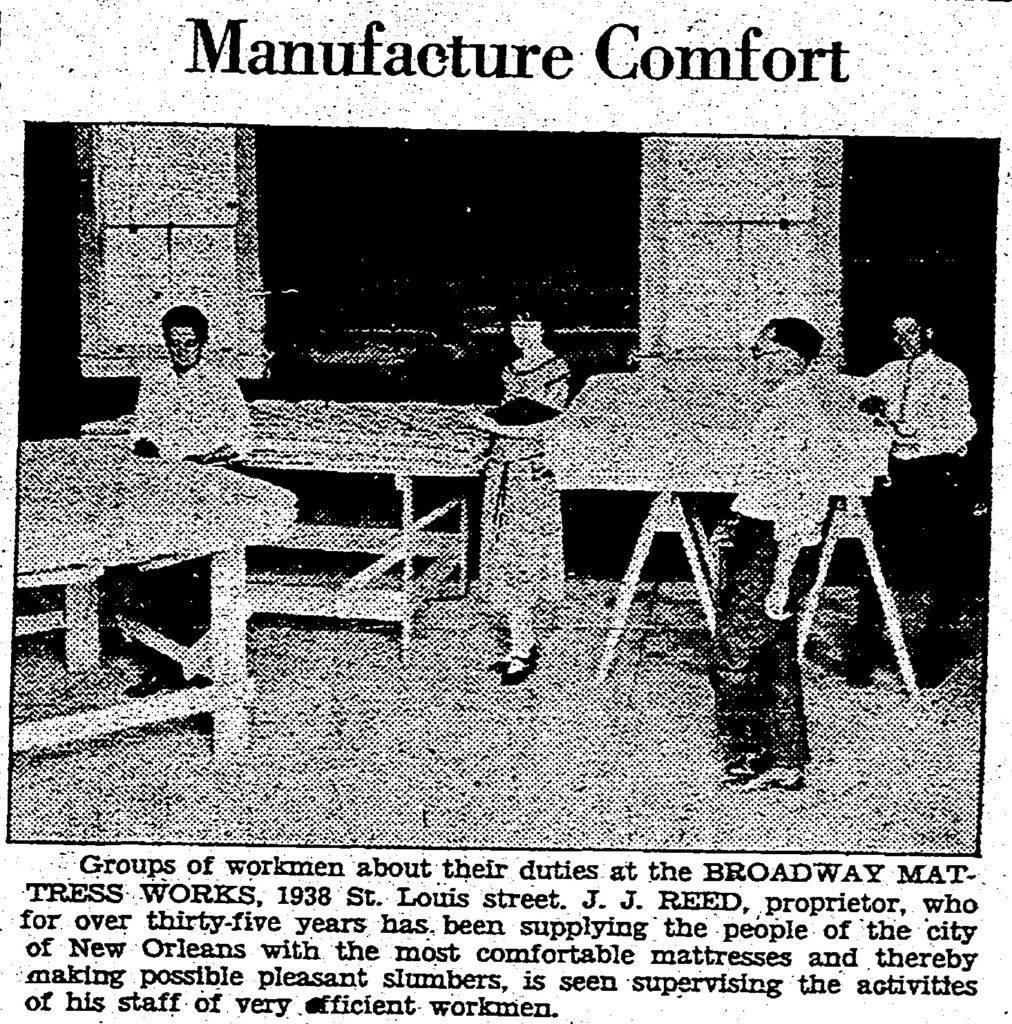

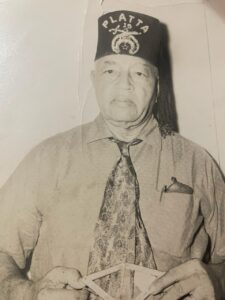



Thanks for the walk down memory lane. I remember the mattress business as though it was yesterday. His grandson, Peter and I were buddies.
Many years ago my husband’s grandmother told me about her family restuffing matresses every spring. It sounded like a lot of work to complete this annual chore!
I don’t know any of these people but I like hearing about New Orleans businesses and people. Two really nice stories.
I work in the mattress industry and have never taken the time to learn about these people. I really appreciate finding this online!